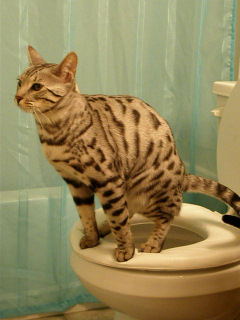Dangers of Disposing Cat Poop in Your Toilet - Precautionary Measures
Dangers of Disposing Cat Poop in Your Toilet - Precautionary Measures
Blog Article
We've come across this post involving Don’t flush cat feces down the toilet down the page on the internet and thought it made perfect sense to write about it with you on this page.

Intro
As feline owners, it's essential to be mindful of how we deal with our feline good friends' waste. While it may seem practical to purge feline poop down the bathroom, this method can have destructive effects for both the setting and human health.
Ecological Impact
Purging pet cat poop introduces dangerous virus and bloodsuckers into the water system, posing a considerable threat to marine ecosystems. These pollutants can negatively impact aquatic life and compromise water quality.
Health and wellness Risks
In addition to environmental problems, flushing pet cat waste can additionally pose wellness risks to human beings. Feline feces might contain Toxoplasma gondii, a parasite that can cause toxoplasmosis-- a potentially extreme health problem, especially for expecting females and people with damaged immune systems.
Alternatives to Flushing
Luckily, there are much safer and a lot more liable ways to take care of cat poop. Think about the complying with alternatives:
1. Scoop and Dispose in Trash
One of the most typical technique of taking care of cat poop is to scoop it right into an eco-friendly bag and throw it in the garbage. Be sure to make use of a dedicated clutter scoop and get rid of the waste without delay.
2. Use Biodegradable Litter
Select naturally degradable cat clutter made from products such as corn or wheat. These trashes are environmentally friendly and can be securely taken care of in the trash.
3. Bury in the Yard
If you have a backyard, consider burying cat waste in a designated area far from veggie yards and water sources. Be sure to dig deep enough to stop contamination of groundwater.
4. Mount a Pet Waste Disposal System
Purchase an animal waste disposal system especially created for cat waste. These systems make use of enzymes to break down the waste, minimizing odor and ecological effect.
Conclusion
Accountable pet possession extends past providing food and sanctuary-- it also includes correct waste administration. By avoiding flushing feline poop down the commode and choosing alternate disposal approaches, we can lessen our ecological impact and secure human wellness.
Why You Should Never Flush Cat Poop Down the Toilet
A rose by any other name might smell as sweet, but not all poop is created equal. Toilets, and our sewage systems, are designed for human excrement, not animal waste. It might seem like it couldn’t hurt to toss cat feces into the loo, but it’s not a good idea to flush cat poop in the toilet.
First and foremost, assuming your cat uses a litter box, any waste is going to have litter on it. And even the smallest amount of litter can wreak havoc on plumbing.
Over time, small amounts build up, filling up your septic system. Most litter sold today is clumping; it is made from a type of clay that hardens when it gets wet. Ever tried to scrape old clumps from the bottom of a litter box? You know just how cement-hard it can get!
Now imagine just a small clump of that stuck in your pipes. A simple de-clogger like Drano isn’t going to cut it. And that means it’s going to cost you big time to fix it.
Parasitic Contamination
Believe it or not, your healthy kitty may be harboring a nasty parasite. Only cats excrete Toxoplasma in their feces. Yet it rarely causes serious health issues in the cats that are infected. Most people will be fine too if infected. Only pregnant women and people with compromised immune systems are at risk. (If you’ve ever heard how women who are expecting are excused from litter cleaning duty, Toxoplasma is why.)
But other animals may have a problem if infected with the parasite. And human water treatment systems aren’t designed to handle it. As a result, the systems don’t remove the parasite before discharging wastewater into local waterways. Fish, shellfish, and other marine life — otters in particular — are susceptible to toxoplasma. If exposed, most will end up with brain damage and many will die.
Depending on the species of fish, they may end up on someone’s fish hook and, ultimately on someone’s dinner plate. If that someone has a chronic illness, they’re at risk.
Skip the Toilet Training
We know there are folks out there who like to toilet train their cats. And we give them props, it takes a lot of work. But thanks to the toxoplasma, it’s not a good idea.

As a person who reads on Can You Flush Cat Poop Down The Toilet?, I was thinking sharing that portion was really useful. If you enjoyed our blog entry please don't forget to share it. I am grateful for your time. Don't hesitate to check our blog back soon.
Booking Page Report this page